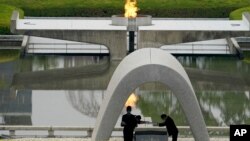The aging survivors of the world's first atomic bombing gathered once again in Hiroshima, Japan, Thursday to observe the 75th anniversary of the attack.
The small crowd at Hiroshima Peace Memorial Park stood for a moment of silence at 8:15 a.m., the exact moment an atomic bomb nicknamed “Little Boy” was dropped from the U.S. warplane Enola Gay, killing 140,000 people and reducing the entire city to ruins.
Unlike past observances, only the “hibakusha,” as the survivors are known, their families and a few dignitaries were in attendance for the landmark anniversary due to the novel coronavirus.
Prime Minister Shinzo Abe used his annual speech to pledge Japan’s commitment to a nuclear-free world, saying the country would act “as a bridge” between the world’s nuclear powers to create common ground in order to reach agreement.
But Hiroshima Mayor Kazumi Matsui called on the Japanese government to sign and ratify the United Nations nuclear weapons ban treaty adopted in 2017, a fact which has frustrated the dwindling numbers of hibakusha. Japan is also under the protection of the U.S. nuclear arsenal, despite Tokyo’s non-nuclear pledge.
“Today, a world without nuclear weapons seems to be slipping further from our grasp,” United Nations Secretary-General Antonio Guterres said in a video message played during the ceremony.
Guterres warned that the “web of arms control, transparency and confidence-building instruments established during the Cold War and its aftermath is fraying. Division, distrust and a lack of dialogue threaten to return the world to unrestrained strategic nuclear competition.”
“Now is the time for dialogue, confidence-building measures, reductions in the size of nuclear arsenals and utmost restraint,” the U.N. chief said.
The bombing of Hiroshima was followed three days later by a second U.S. atomic bombing on the city of Nagasaki, which killed more than 70,000 people. The second bombing prompted Japan to surrender unconditionally to Allied forces on August 15, bringing an end to World War Two and Japan’s half-century of aggression in Asia.





